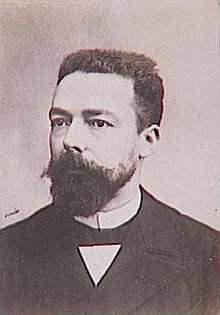Paul Doumer
| Paul Doumer | |
|---|---|
 | |
| President of the French Republic | |
|
In office 13 June 1931 – 7 May 1932 | |
| Prime Minister |
Pierre Laval André Tardieu |
| Preceded by | Gaston Doumergue |
| Succeeded by | Albert François Lebrun |
| Personal details | |
| Born |
22 March 1857 Aurillac, France |
| Died |
7 May 1932 (aged 75) Paris, France |
| Political party | Radical Party |
Joseph Athanase Gaston Paul Doumer, commonly known as Paul Doumer (French pronunciation: [pɔl dumɛːʀ]; 22 March 1857 – 7 May 1932) was the President of France from 13 June 1931 until his assassination.
Biography
He was born in Aurillac, in the Cantal département, in France on 22 March 1857. Alumnus of the Conservatoire National des Arts et Métiers.[1] He became a professor of mathematics at Mende in 1877.
In 1878 he married Blanche Richel, whom he had met at college. They had eight children, five of whom were killed in the First World War (including the French air ace René Doumer).
From 1879 until 1883 he was professor at Remiremont, before leaving on health grounds. He then became chief editor of Courrier de l'Aisne, a French regional newspaper. Initiated into Freemasonry in 1879, at "L'Union Fraternelle" lodge, he became Grand Secretary of Grand Orient de France in 1892.[2][3][4]

He made his debut in politics as chef de cabinet to Charles Floquet, when Floquet was president of the chamber in 1885. In 1888, Doumer was elected Radical deputy for the department of Aisne. Defeated in the general elections of September 1889, he was elected again in 1890 by the arrondissement of Auxerre. He was briefly Minister of Finance of France (1895–1896) when he tried without success to introduce an income tax.[5]
He was Governor-General of French Indochina from 1897 to 1902. Upon his arrival the colonies were losing millions of francs each year. Determined to put them on a paying basis he levied taxes on opium, wine and the salt trade. The Vietnamese, Cambodians and Laotians who could or would not pay these taxes, lost their houses and land, and often became day laborers. He established Indochina as a market for French products and a source of profitable investment by French businessmen.[6] The Long Bien Bridge was built during his term as Governor-General and was named for him. It became a well-known landmark and target for US pilots during the Vietnam War.
After returning from French Indochina, Doumer was elected by Laon to the chamber as a Radical. He refused, however, to support the ministry of Émile Combes, and formed a Radical dissident group, which grew in strength and eventually caused the fall of the ministry.[5] He then served as President of the Chamber of Deputies (a post equivalent to the speaker of parliament) from 1902 to 1905.
He became Minister of Finance of France again in 1925 when Louis Loucheur resigned.[7] He then served as President of the French Senate from 1927 until the 1931 presidential election. He was elected President of the French Republic on 13 May 1931, defeating the better known Aristide Briand, and replacing Gaston Doumergue.[8]
Assassination
On 6 May 1932, Paul Doumer was in Paris at the opening of a book fair at the Hôtel Salomon de Rothschild, talking to the author Claude Farrère. Suddenly several shots were fired by Paul Gorguloff, a mentally unstable Russian émigré, who was also present. Two of the shots hit Doumer, at the base of the skull and in the right armpit, and he fell to the ground. Claude Farrère wrestled with the assassin before the police arrived. Doumer was rushed to hospital in Paris, where he died at 04:37 AM on 7 May. He was the only French president to die of a gunshot wound.
Writings
As an author he is known by his L'Indo-Chine française (1904), and Le Livre de mes fils (1906).[5]
See also
References
- ↑ Alumnus of the Conservatoire National des Arts et Métiers
- ↑ Dictionnaire de la Franc-Maçonnerie, page 363 (Daniel Ligou, Presses Universitaires de France, 2006)
- ↑ Dictionnaire universelle de la Franc-Maçonnerie, page 245 (Marc de Jode, Monique Cara and Jean-Marc Cara, ed. Larousse , 2011)
- ↑ Histoire de la Franc-Maçonnerie française (Pierre Chevallier, ed. Fayard, 1975)
- 1 2 3
 One or more of the preceding sentences incorporates text from a publication now in the public domain: Chisholm, Hugh, ed. (1911). "Doumer, Paul". Encyclopædia Britannica. 8 (11th ed.). Cambridge University Press. p. 450.
One or more of the preceding sentences incorporates text from a publication now in the public domain: Chisholm, Hugh, ed. (1911). "Doumer, Paul". Encyclopædia Britannica. 8 (11th ed.). Cambridge University Press. p. 450. - ↑ Ladenburg, Thomas. "The French in Indochina" (PDF). digitalhistory.uh.edu. University of Houston. Retrieved 11 September 2015.
- ↑ "Paul Doumer Has Succeeded Louis Loucheur. Latter Forced to Resign as Minister of Finance. Other Names Mentioned". United Press. December 16, 1925. Retrieved 2010-11-13.
Paul Doumer has been chosen by Aristide Briand, Prime Minister, to replace Louis Loncheur, whose resignation, as foreshadowed by ...
- ↑ "Paul Doumer Becomes President Of France". United Press. June 14, 1931. Retrieved 2010-11-13.
Paul Doumer, the oldest man ever elected to the position, succeeded Gaston Doumergue as president of the third French republic Saturday in ...
| Political offices | ||
|---|---|---|
| Preceded by Gaston Doumergue |
President of France 1931–1932 |
Succeeded by Albert Lebrun |
| Regnal titles | ||
| Preceded by Gaston Doumergue and Justí Guitart i Vilardebó |
Co-Prince of Andorra 1931–1932 with Justí Guitart i Vilardebó |
Succeeded by Albert Lebrun and Justí Guitart i Vilardebó |